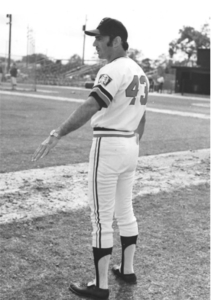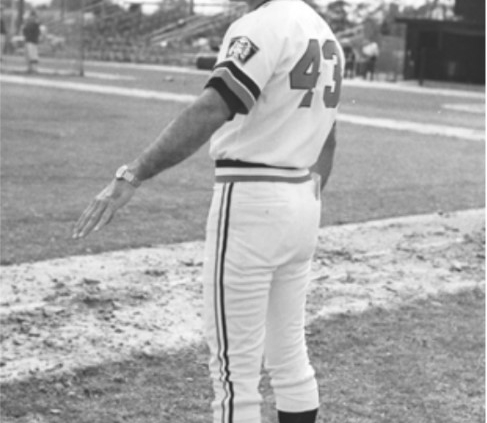July 7, 1972: Killebrew’s homer wins it for Quilici in debut as Twins manager
 On Friday, July 7, 1972, presidential candidates arrived in Miami for the 1972 Republican National Convention that nominated Richard Nixon. Billie Jean King won the women’s title at Wimbledon. And, that night at Metropolitan Stadium, two Twins greats did what they could so well: Harmon Killebrew slugged a go-ahead home run and Rod Carew drove in two runs with an infield single.
On Friday, July 7, 1972, presidential candidates arrived in Miami for the 1972 Republican National Convention that nominated Richard Nixon. Billie Jean King won the women’s title at Wimbledon. And, that night at Metropolitan Stadium, two Twins greats did what they could so well: Harmon Killebrew slugged a go-ahead home run and Rod Carew drove in two runs with an infield single.
But the biggest headline in the next day’s Minneapolis Tribune belonged to neither Killebrew nor Carew. Instead, it went to a man who had backed them up in the Twins’ infield for a half-dozen years, Frank Quilici.
“Twins Win 5-2; Quilici Record 1.000,” the headline the next morning read.1
The Twins defeated the New York Yankees 5-2 in Quilici’s debut as a major-league manager in front of 19,514 fans, to that point the Twins’ largest home crowd of the season.
The likable Quilici was greeted with a “standing ovation … when he brought the lineup card to home plate at the start of the game.”2
Fans weren’t the only ones excited about Quilici’s debut.
“Do I feel more anxious to play?” Carew said. “Only about 200 percent more.”3
At 33, Quilici became the youngest manager in the major leagues. He replaced Bill Rigney, who was fired after the Twins finished a dreary road trip 1-5, including losing their last four in a row. Not only were they losing, their offense was nearly impotent: In the five losses, they’d scored a total of four runs and were shut out in back-to-back games in the last two. Not that things had gone much better at home: In their previous homestand, the team’s attendance was as anemic as the hitting had been on the road. The Twins drew late-June crowds of 12,803, 6,815, 6,475, 12,668 (for a doubleheader), and 5,099, as they fell out of the American League West race.
After leading the American League in attendance in their first decade (1961-1970), they’d failed to draw 1 million fans for the first time in 1971. In midsummer 1972, they were becoming an attendance afterthought, something owner Calvin Griffith couldn’t abide. He knew the Twins needed a jolt.
Although well-liked by players and fans and a link to past Twins glory, Quilici was not necessarily the obvious choice to replace Rigney. After he retired in 1970, he was largely given a “cheerleader role,” as a coach without portfolio – a loosely fitting position that basically gave him a uniform and paycheck but no duties and did not count toward his major league pension.4 But he had played in all seven games of the 1965 World Series, was on the 1969 and 1970 American League West Division championship teams, and “was as well-known in this state as Hubert Humphrey,”5 according to Griffith. The young Quilici was considered a good communicator who could be fiery when needed, and his youth was in his favor. After thinking it through, Griffith decided Quilici might inspire the Twins.
“We believe this is a team with a lot of potential,” Griffith said in a news conference to announce the managerial change, with a smiling Qulici at his side. “We have better players than we had last year. Our pitching is much better and our hitters aren’t the worst in the American League. I think we’re fifth in team batting.”
“This move has been going through my mind for a couple of weeks. I haven’t been able to sleep well the past two nights, though. . . . I think Frank can stimulate the players and give baseball back to the fans. I hope he has better luck than Rigney.”6
Quilici said he wanted players who would hustle and dedicate themselves to the game, and planned on using his open brand of communication.
“I don’t think managing in my first major-league game compares to anything else that’s happened to me,” he said. “I think I’ve had enough time to have the importance of the job register, but I certainly am starting to feel the challenge of the job – what it can mean to our team, the organization, the people in the stands.”7
As Quilici’s first game started, the Twins looked more like they had in their losing road trip than anything fresh: They trailed 2-1 through six innings and had left eight runners on base. Quilici was getting nervous.
“I told the guys on the bench that this was a lot of fun,” Quilici joked. “Hey, [here] we’re losing the game. I sensed that maybe they were trying too hard to give me a win in my first game.”8
With two outs in the bottom of the seventh, Carew singled to center field. The next batter, Killebrew, homered off starting and losing pitcher Fritz Peterson to turn the game around, giving the Twins a 3-2 lead. Not a surprise: Killebrew always hit Peterson well. His .324 lifetime average against Peterson was the best of the 20 pitchers he had the most plate appearances against. But Killebrew didn’t hit for much power against Peterson – only three doubles, two home runs and a .485 slugging average.9 But one of those home runs came here and, from Quilici’s perspective, was well-timed.
“I wanted to jump through the roof of the dugout,” Quilici said. “The first thing I thought of when Harmon hit that ball was [the home run] he got against the Yankees in 1965, right before the All-Star Game.” The 1965 homer helped propel the Twins to the American League pennant. “I don’t know why I thought of that particular hit, but maybe it’s because I was down at Denver [in the minor leagues] right then and a few days later I joined the Twins. Maybe, too, it’s right around the All-Star break now.”10
“Killebrew smiled when told of Quilici’s remark. ‘I hope that means we can do the same thing again this year.’”11
Killebrew said the home run “meant a little something extra ‘because Frank and I have been close friends for a long time.’”12
Along with Killebrew’s homer, “some dipsy-do, in the eighth inning, provided Quilici with the victory.”13
In the eighth, the Twins had George Mitterwald on third base and speedy Cesar Tovar on second base with one out. A nervous Quilici whiffed on calling for a squeeze bunt with Danny Thompson at the plate, and Thompson ended up flying out. Carew was up next and hit a slow roller down the first-base line. “He dipped around Felipe Alou’s tag – in the view of umpire Bill Kunkel – and grabbed the bag with an outstretched dive.”14
Mitterwald scored and Tovar “kept streaming around third base” and scored, too, while Alou “discussed” the play with Kunkel.15 The two runs gave the Twins a 5-2 lead and made a winning pitcher of reliever Wayne Granger, who threw three scoreless innings to finish the game.
Carew said of the play at first base, “Normally I try to run with long strides. But last night I really tried to burn it down the line. You try to do everything to win [for Quilici], I guess.”16
Carew had three hits to go with his two runs batted in. “Everyone wanted to get off on the right foot for Quilici. … I busted my butt to try to help Frank win his first game.”17
Griffith, who’d been so unhappy with the team’s performance that he could barely sleep, liked what he saw in Quilici’s debut.
“It was a different type of hustle. They looked like a different team to me.”18
The Twins’ attendance bump continued for the rest of the Yankees series, with a crowd of 14,866 the next day and 19,613 for the finale.19
Yet for the season, the Twins didn’t prove any more successful under Quilici than under Rigney. They were 41-43 under Quilici after going 36-34 for Rigney. Their total home attendance was 797,901 in the strike-shortened year. Quilici lasted as manager until the end of the 1975 season, when he was fired with a career record of 280-287.20 He became a Twins broadcaster for a time and a longtime goodwill ambassador for the team.
Notes
1 Jon Roe, “Twins Win 5-2; Quilici Record 1.000,” Minneapolis Tribune, July 8, 1972: 1B.
2 Roe.
3 “For Quilici, 1st Day Means Meetings, TV and Tipped Cap,” Minneapolis Tribune, July 8, 1972: 3B.
4 Bob Fowler, “Quilici Leads with Gentle Talk – or Left Hook,” The Sporting News, July 29, 1972: 31.
5 Bob Fowler, “Cal Expects Quilici to Lure Fans Back to Twins,” The Sporting News, July 22, 1972: 19.
6 Bob Fowler, “Cal Expects Quilici to Lure Fans Back to Twins.”
7 “For Quilici, 1st Day Means Meetings, TV and Tipped Cap.”
8 Roe.
9 baseball-reference.com, Killebrew vs. opposing pitchers.
10 Roe.
11 Roe.
12 Sid Hartman, “Twins Worked Harder for New Pilot Quilici,” Minneapolis Tribune, July 8, 1972: 3B.
13 Roe.
14 Roe; retrosheet.org.
15 Roe.
16 Roe.
17 Hartman.
18 Hartman.
19 baseball-reference.com.
20 All statistics in this paragraph from baseball-reference.com.
Additional Stats
Minnesota Twins 5
New York Yankees 2
Metropolitan Stadium
Bloomington, MN
Box Score + PBP:
Corrections? Additions?
If you can help us improve this game story, contact us.


